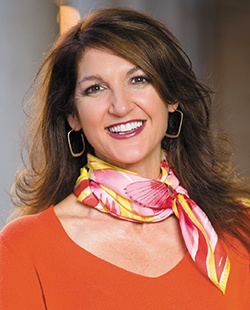A State of Retail Unity (OPINION)
by April 27, 2015 12:00 am 132 views

In Bentonville, a mass of energy has built around what seems an innocuous, humble thing: the headband, which JUNK Brands has turned hot.
And the extraordinarily cooperative nature of the Northwest Arkansas retail community has again played its role.
We spent time with JUNK co-founder Kourtney Barrett earlier this month, when she spoke at our spring CPG School, along with 18 other experts from our retail-centric region.
Kourtney detailed her company’s dizzying trajectory since she (a former real estate broker) and her husband Beau (a tech guru) decided in 2011 to market the often-admired homemade headbands she wore. I was curious how in three years they developed such mastery in apparel, manufacturing, retail sales, hiring and quality control.
“I feel like I get up and go to school every day,” Kourtney said of her role leading a company that grew annual sales between 275 percent and 330 percent each year since 2012.
Entering the JUNK Brands office in Bentonville feels surreal; what used to be the Cox Communications building now hosts dozens of workers busily designing, cutting and sewing. Expensive, industrial heat presses churn out product while a high-tech computer system calculates orders, tracks waste and productivity, and oversees quality control at each workstation.
Kourtney and Beau transformed a tired product into something that feels like comfort clothing, looks like a status symbol, but performs like a technical item. And the JUNK name has proved endearing for customers.
One of the cool things about the Barretts is how they fearlessly forego some common “rules” of retail, preferring to figure things out themselves. Beau is a marketing genius, a tinkerer, a tech specialist by day who renovates homes on the side. Kourtney is strong with relationships, visioning, and management, and they complement each other.
But there’s one other thing they do well, and that’s accepting well-placed advice and help. Because they live in what Beau calls the Silicon Valley equivalent of retail innovation, they’ve formed critical mentoring relationships here.
When she was a teen, Kourtney babysat for the family of Paul Mahan, founder of the successful Outdoor Cap Co. in Bentonville. Early on, Kourtney consulted Mahan about whether JUNK should be a product, or a brand? He wisely advised that it could be both. She also sought his counsel before forming partnerships with Reebok and CrossFit, and he’s contributed vital banking advice.
Later, Kourtney met Burt Hanna of Hanna’s Candles, whose niece had been in her wedding. He became an encourager and adviser. “He’s full of good ideas, and shares them with us regularly,” Kourtney says.
Whenever Kourtney needs expertise, she looks first for a mentor. “We have access to such rich knowledge in our area that we haven’t had to hire outside consults often,” she says.
NWA’s unique demographic advantage, with a high concentration of companies supplying Wal-Mart Stores Inc., creates a breeding ground for mentoring relationships — which are critical for students engaged in the retail sciences, said Dr. Loray Mosher, assistant director of the Supply Chain Management Research Center at the University of Arkansas Sam M. Walton College of Business.
High-level executives across our region, from sectors that include consumer products, pharmaceutical, analytics and rail and trucking transportation, are actively mentoring students.
These mentors value seeing the world through the eyes of the younger generation, Mosher says.
“They enjoy knowing their experience goes beyond themselves, and there is a satisfaction in passing that expertise to a mentee,” just as Kourtney finds herself surrounded by people advising her in a way that enhances her own development, Mosher says.
Robin Mero is content director for Bentonville-based Selling to the Masses, which serves as a destination for resources to help early-stage, consumer-product companies get and stay on the shelves of the country’s top retailers. She can be reached at [email protected].
